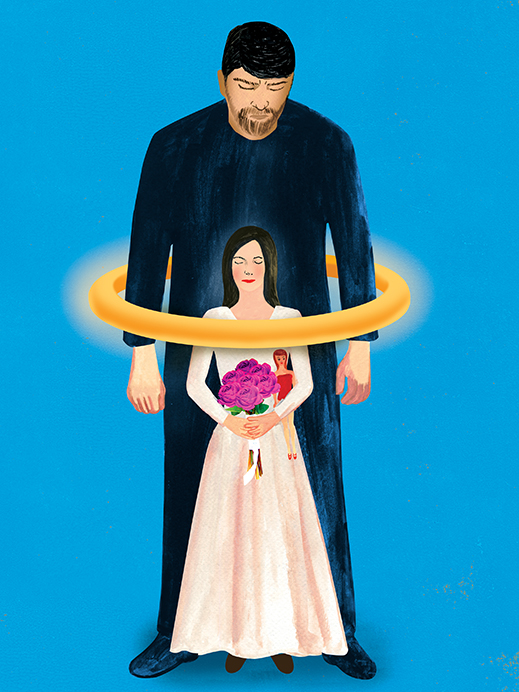Unchained at Last Aims to End Child and Forced Marriages
February 15, 2019 – Leslie Garisto Pfaff, New Jersey Monthly
Fraidy Reiss fled a forced marriage after 12 years of abuse. Now she’s helping hundreds of other victims escape their bonds.

They contact her by e-mail, text and phone, entreating her to help them, each story more heartrending than the last. The teenager whose parents are determined to marry her off to an older cousin. The couple who grew up in a religious cult and were married against their will at 15. The young gay woman forced into marriage at 19 to a man who repeatedly beat and raped her. The sisters whose abusive father wanted them to marry men he could control. Their stories haunt Fraidy Reiss, but they also impel her to action. The founder of Unchained at Last, a nonprofit based in Westfield and dedicated to ending forced and child marriage in the United States, Reiss understands the stories as if they were her own. Because, in fact, they are.
Raised in an ultra-Orthodox Jewish community in Brooklyn, Reiss was forced, at 19, to marry a virtual stranger who threatened to kill her less than two weeks after the wedding and continued to do so for the 12 years they were together. Eventually, she found a way out of the marriage—an extraordinarily difficult and courageous act for a woman raised in an ultra-conservative religious milieu. As she built a new life for herself and her two daughters, she found she couldn’t forget the suffering of other women like her. It was that sense of survivor’s guilt that became the impetus for the founding of Unchained at Last in 2011.
If you think that forced marriage is a third-world problem, or perhaps limited in the United States to fringe religious communities, Reiss will quickly set you straight. In her small office, she reels off the statistics: “Across the U.S., between 2000 and 2010, an estimated 248,000 children were married, some as young as 12, almost all of them girls married to older men.” (The estimate is based on the available data from 38 states.)
There are no hard numbers on forced marriages overall, but anecdotally, Reiss says, “I can tell you it’s happening everywhere. Our clients come from every major religion, minor religions, secular backgrounds; they come from every socioeconomic level; they come from families who’ve been in America for many generations and from immigrant families from countries of origin on every inhabited continent.” It’s happening in the LGBTQ community, where parents employ forced marriage as a form of conversion therapy. And in the vast majority of cases Reiss has worked on, the perpetrators are parents. “Think about that betrayal,” she says. “The people you’d normally go to for help are the ones causing you harm.”
That was certainly Reiss’s experience, but it wasn’t one she rebelled against initially. As a teenager in the ultra-Orthodox community, she expected an arranged marriage, even welcomed it. It was only when her husband began to threaten her that she realized there could be a downside to the custom. “He would describe to me in detail how he was going to kill me,” she says, “and he gave me good reason to believe him, because while he was saying it, he would punch his fist through the wall, smash windows, dishes, furniture.” Still, she had two children with him and moved with him to an Orthodox community in New Jersey, all the while enduring his mounting abuse. At 27, she says, “I realized that the only way out of the marriage, other than a coffin, was through an education.”
She enrolled in Rutgers, graduating at 32 with a degree in journalism, and found a job as a reporter at the Asbury Park Press. In her last year at Rutgers, she’d stopped wearing a head covering—traditional for Orthodox women. Her parents’ response was to declare her dead to them. In a strange sense, that freed her to leave the marriage. “I was no longer worried about losing my family,” she says. “I’d already lost them, so what more could I lose?” She changed the locks, filed for divorce, and four years later, scraped together enough cash to buy a small Cape Cod in Union County, which she and her daughters referred to as the Palais de Triomphe. That same month, she founded Unchained, the only U.S. nonprofit devoted to aiding and advocating for victims of forced and child marriage.
Reiss figured she could devote a couple of hours a week to it: maybe help five women the first year, 10 the next, offer some emotional support, help them find pro bono attorneys. “By the end of the first year,” she says, “Unchained had 30 clients, and they needed a lot more than just emotional support and attorneys.” Often, the women are fearful they’ll be tracked down and returned to their marriages. For this reason, Unchained fiercely guards their privacy. (Due to privacy issues, New Jersey Monthly was unable to interview any of the women for this story.)
From its inception as a one-woman operation to its current stature as a globally recognized nonprofit with a full-time staff of four and a devoted cadre of volunteers, Unchained has helped more than 500 women and girls escape forced marriage, offering them a safe haven (usually a shelter for survivors of domestic violence), free legal aid to secure a divorce (and sometimes, a restraining order), and emotional support for as long as it’s needed. The organization offers assistance to any girl or woman in the U.S. who, in the words of its mission statement, is or has been pressured, bribed, tricked, threatened, beaten or otherwise forced into marriage, as well as American citizens who have been taken overseas for the purposes of forced marriage.
Clients find Unchained through word of mouth or referrals from law-enforcement or domestic-violence agencies. When a woman is taken overseas for a forced marriage and makes her way into a U.S. embassy, the State Department may refer her to Unchained. Some find the organization through an online search, even in religious communities that ban the Internet. (“It’s really hard to enforce those Internet bans,” Reiss says from personal experience.)
Unfortunately, if those clients are under 18, the extent of the help that Unchained can offer is limited. That’s because, thanks to a variety of legal loopholes, child marriage is still legal in 48 states. And then there are the various legal measures designed to protect children: In most states, for instance, it’s illegal to help a child leave home. In addition, largely because of liability issues, most domestic-violence shelters won’t take in a child without a parent or guardian.
“That means,” says Reiss, “that in a lot of states right now, children can marry but aren’t allowed to file for divorce. We like to say that puts the ‘lock’ in ‘wedlock.’” What’s more, in most states, it’s virtually impossible for a child to retain an attorney or mount a legal action in her or his own name.

“Think about that betrayal,” says Reiss. “The people you’d normally go to for help are the ones causing you harm.” Photo by Jennifer S. Altman
Given those realities, Reiss felt it was a no-brainer to advocate for a legal ban on child marriage. However, it would have to be done on a state-by-state basis, and eventually on the federal level. She figured that most legislators wouldn’t even be aware that child marriage was still legal, or would think that it was simply the result of archaic laws that no one had seen fit to remove from the books. Once they knew, she assumed, arriving at a legislative fix would be a slam dunk.
Her first assumption turned out to be correct; alas, the second, she learned as she proposed the legislation to lawmakers across the country, was a tougher hurdle. “In state after state,” Reiss says, “the argument was that if a girl got pregnant, she had no choice—she’d have to get married, even if she was raped.”
Reiss and Unchained battled on, wielding statistics as a weapon. Consider, they told the legislators, that a teenage girl who marries in the United States is 31 percent more likely to live in poverty and 51 percent more likely to drop out of high school, and that globally, child marriage makes a woman three times more likely to be a victim of domestic violence than if she marries at 21 or older.
Concentrating on her home state of New Jersey, Reiss chipped away at legislative resistance until all but five legislators gave the thumbs up to a bill raising the minimum age to marry to 18. (Previous state law permitted 16- and 17-year-olds to marry with parental consent, and those under 16 with the consent of parents and a judge.) The bill passed both houses of the Legislature in 2017, but Governor Chris Christie vetoed it, citing religious customs and recommending that it restrict marriage to those 16 and older. Meanwhile, Reiss and Unchained got a bill banning child marriage—the first of its kind in the nation—passed in Delaware in May 2018. The New Jersey bill was brought up again and signed into law last June by Governor Phil Murphy.
Assemblywoman Nancy Munoz (R-Union), a sponsor of the bill, ascribes much of its success to Reiss. “She was determined,” says Munoz. “She visited the offices of the majority of legislators, and she was extremely persuasive. She had the facts on her side, and she wouldn’t back down.” Munoz notes that she has sponsored many pieces of legislation, but the bill banning child marriage is one of which she is especially proud.
So far, Reiss and Unchained have helped to introduce similar legislation in more than 20 states, with the goal of getting child marriage banned nationwide. But even if that happens, Reiss says, she’ll probably be in business for a long time to come. Women over 18, after all, can still be forced into marriage, and few states have laws banning forced marriage overall. Then there’s the problem of parents forcing their children to marry in religious-only ceremonies. In some states it’s illegal to officiate at a marriage without a civil marriage certificate, “but that doesn’t stop the practice from happening,” Reiss says.
If Reiss is angry, she’s also remarkably upbeat. As she tells her story, she pulls up her sleeve to reveal a tattoo braceleting her right wrist; it depicts a series of links, one of which has been explosively severed. In the early days of the fight to ban child marriage, she explains, she and her staff vowed to get celebratory tattoos when the first bill was signed into law. Getting that tattoo, she says, was one of the most triumphant moments of her life. Given her iron determination to right the wrong of forced marriage, that triumph is likely to be one of many.






